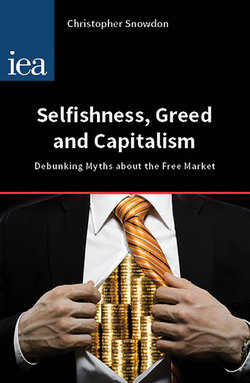Читать книгу Selfishness, Greed and Capitalism - Christopher Snowdon - Страница 11
На сайте Литреса книга снята с продажи.
Is greed good?
ОглавлениеIs there a sense in which ‘greed is good’? Adam Smith would never have used such a crass phrase, not least because he did not believe it. Those words were spoken by the fictional Gordon Gekko, an executive at the fictional company Teldar Paper, and were written by the left-wing film director Oliver Stone in the 1987 corporate satire Wall Street. Even this grotesque caricature of a wheeler-dealer admits that the word ‘greed’ is not wholly satisfactory as a description of the mechanism that drives economic progress:
Greed, for lack of a better word, is good. Greed is right. Greed works. Greed clarifies, cuts through, and captures the essence of the evolutionary spirit. Greed, in all of its forms; greed for life, for money, for love, knowledge, has marked the upward surge of mankind and greed, you mark my words, will not only save Teldar Paper, but that other malfunctioning corporation called the U.S.A.
In the film, greed turns out to be not so good for Gordon Gekko, who is convicted of insider trading and sent to prison. Free-market economists would have shed no tears for the man. They know that greed can lead to great evils and that markets must be circumscribed within the rule of law. Greed is not good. It can lead us towards criminality, as it did with the fictional Gordon Gekko and the real-life Bernie Madoff; but theft, deceit and corruption are risks in any society. For good or ill, selfishness and avarice – and, for that matter, sloth and lust – are also features of any society, be it feudal, socialist or capitalist. They are not unique to free markets and there is no reason to believe that capitalism breeds them. To quote Tom Palmer (2011: 66):
I know of no good reason to think that markets promote selfishness or greed, in the sense that market interaction increases the quantum of greediness or the propensity of people to be selfish, over what is observed in societies governed by states that suppress or discourage or interfere in or disrupt markets.
But while greed is not good, it is senseless to pretend that it does not exist or that it can somehow be erased from the character of mankind. Whereas self-interest can only be pursued in tribal, feudal or socialist societies at the expense of others through the pursuit of power, free-market capitalism is able to harness self-interest and direct it towards activities that are beneficial to others. As David Boaz (2011: 35) puts it:
Critics of markets often complain that capitalism encourages and rewards self-interest. In fact, people are self-interested under any political system. Markets channel their self-interest in socially beneficent directions. In a free market, people achieve their own purposes by finding out what others want and trying to offer it.
Capitalism does not rely on selfish motives, but it is able to put selfish motives to good ends where such motives exist. In any case, the moral objection that capitalism ‘rewards greed’ (Kaufman 2012: xi) is ill-founded. Greedy men dislike free markets because the existence of competition prevents them from charging too much and providing too little. They are forever seeking special protection from the government to make markets less free, keep prices high and exclude competitors. Capitalism is robust against selfishness, not dependent on it. Socialism, by contrast, depends on altruism. In the words of Arthur Seldon (2004: 344):
The virtue of capitalism is that it divorces purpose from result. It does not require good men or women. The vice of socialism is that men and women who may start with good intentions, but who are skilled in acquiring coercive power, can use it to do harm.
Ha-Joon Chang claims that an economic system that relied on ‘the self-seeking individuals found in economic textbooks … would grind to a halt because we would be spending most of our time cheating, trying to catch the cheaters, and punishing the caught’ (Chang 2010: 41). Such a society would, he says ‘collapse under the weight of continuous cheating, monitoring, punishment and bargaining’ (Chang 2010: 255). In fact, this is a pretty good description of what happened in the socialist utopias of Eastern Europe in the twentieth century. Continual monitoring and punishment were necessary in those unfortunate countries precisely because there was no invisible hand to peacefully direct labour towards socially beneficial outcomes. By replacing the invisible hand of free enterprise with the dead hand of the state, communist societies were forced to rely on surveillance and propaganda to keep workers in line. Without adequate financial incentives to reward them, citizens felt little urge to toil for the betterment of society. Their self-interest was best served by shirking, cheating and stealing. As the Russian joke went: ‘We pretend to work and they pretend to pay us.’
